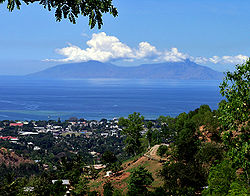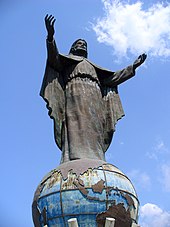This is an old revision of this page, as edited by 189.41.242.19 (talk) at 09:03, 21 March 2010 (So, find one. Until there, the last law is the valid one. http://pt.legislacao.org/primeira-serie/portaria-n-o-19409-prata-ouro-azul-listel-6778). The present address (URL) is a permanent link to this revision, which may differ significantly from the current revision.
Revision as of 09:03, 21 March 2010 by 189.41.242.19 (talk) (So, find one. Until there, the last law is the valid one. http://pt.legislacao.org/primeira-serie/portaria-n-o-19409-prata-ouro-azul-listel-6778)(diff) ← Previous revision | Latest revision (diff) | Newer revision → (diff) For other places with the same name, see Dili (disambiguation). Place in Dili District, East Timor| Dili | |
|---|---|
 | |
| Flag of DiliFlagCoat of arms of DiliCoat of arms | |
 | |
| Country | East Timor |
| District | Dili District |
| Settled | 1520 |
| Population | |
| • Total | ~150,000 |
Dili (deelee), spelled Díli in Portuguese, is the capital and largest city of East Timor. It lies on the northern coast of Timor island, the easternmost of the Lesser Sunda Islands. Dili is the chief port and commercial centre for East Timor, and has approximately 150,000 inhabitants. There is also an airport in Comoro, Presidente Nicolau Lobato International Airport, renamed after independence leader Nicolau Lobato, which is used for commercial and military flights. Dili is located at 8°34′S 125°34′E / 8.567°S 125.567°E / -8.567; 125.567. It is also the capital of the district of Dili, which includes the surrounding area.
History
Dili was settled about 1520 by the Portuguese, who made it the capital of Portuguese Timor in 1769. During World War II, Dili was occupied by the Japanese. East Timor unilaterally declared independence from Portugal on November 28, 1975. However, nine days later, on December 7, Indonesian forces invaded Dili. On July 17, 1976, Indonesia annexed East Timor, which it designated the 27 province of Indonesia, Timor Timur (Indonesian for East Timor), with Dili as its capital.
However, a guerrilla war ensued from 1975 to 1999 between Indonesian and pro-independence forces, during which tens of thousands of East Timor's and some foreign civilians were killed. Media coverage of the 1991 Dili Massacre helped revitalise international support for the East Timorese independence movement. In 1999, East Timor was placed under UN supervision and on May 20, 2002, Dili became the capital of the newly independent Democratic Republic of Timor-Leste. In May 2006, fighting and rioting sparked by conflict between elements of the military caused significant damage to the city and led to foreign military intervention to restore order.
Buildings and monuments

Most buildings were destroyed in the violence of 1999, orchestrated by the Indonesian military and local pro-Indonesia militias (see Operation Scorched Earth). However, the city still has many buildings from the Portuguese era. The former Portuguese Governor's office is now the office of the Prime Minister. It was previously also used by the Indonesian-appointed Governor, and by the United Nations Transitional Administration in East Timor (UNTAET).

Even under Indonesian rule, during which the Portuguese language was banned, Portuguese street names like Avenida Marechal Carmona remained unchanged, although they were prefixed with the Indonesian word Jalan or 'road'. The Roman Catholic Church at Motael became a focus for resistance to Indonesian occupation.
Legacies of Jakarta's occupation are the Church of the Immaculate Conception, seat of the Roman Catholic Diocese of Díli, purportedly the largest cathedral in Southeast Asia, and the 'Integration Monument', commemorating the Indonesian annexation of the territory in 1976. Featuring a statue of a Timorese in traditional dress, breaking the chains round his wrists, the monument has not been demolished.
Education

Schools in Dili include St. Joseph’s High School (Colégio de São José). There are three International schools in Dili, an Australian managed school by the name of Dili International School, an American government sponsored school, called Quality International School and the Dili Education & Development Center, a Philippine International School. East Timor's major higher education institution, the Universidade Nacional de Timor-Leste, is based in Dili.
Transportation

Dili is serviced by Presidente Nicolau Lobato International Airport, the only international airport in East Timor. Dili has the only functioning international airport, though there are airstrips in Baucau, Suai and Oecusse used for domestic flights. Until recently, Dili's airport runway has been unable to accommodate aircraft larger than the Boeing 737 or C-130 Hercules, but in January 2008, the Portuguese charter airline EuroAtlantic Airways operated a direct flight from Lisbon using a Boeing 757, carrying 140 members of the Guarda Nacional Republicana. Under Portuguese rule, Baucau airport, which has a much longer runway, was used for international flights, but following the Indonesian invasion this was taken over by the Indonesian military and closed to civilian traffic.
Sister cities
Gallery
-
 Fisher boat in Dili
Fisher boat in Dili
-
 Government Palace
Government Palace
-
 View looking across to Atauro
View looking across to Atauro
- Flag of Dili in colonial time Flag of Dili in colonial time
References
External links
- Discover Dili - Tourism promotion site
8°33′S 125°35′E / 8.550°S 125.583°E / -8.550; 125.583
| Capitals of Municipalities of East Timor | ||
|---|---|---|
| Capitals of Asia | |||||||||||
|---|---|---|---|---|---|---|---|---|---|---|---|
| Dependent territories and states with limited recognition are in italics | |||||||||||
| |||||||||||
| * Disputed. See: Chagos Archipelago sovereignty dispute, Cyprus dispute, Status of Jerusalem, Abkhaz-Georgian conflict and Georgian-Ossetian conflict | |||||||||||
| Capitals of Oceania | |
|---|---|
| Dependent territories are in italics | |
| Australasia | |
| Melanesia | |
| Micronesia | |
| Polynesia | |
| |